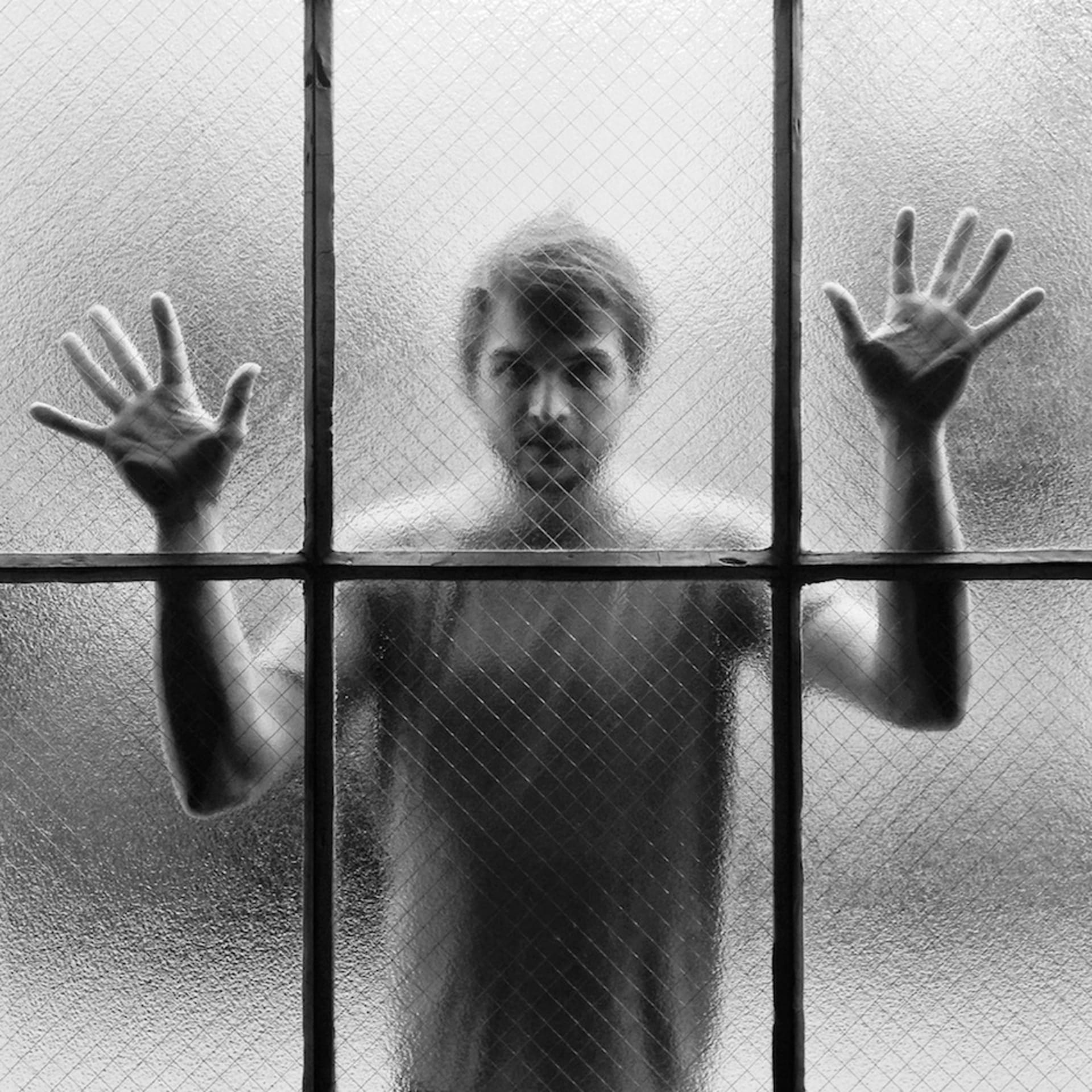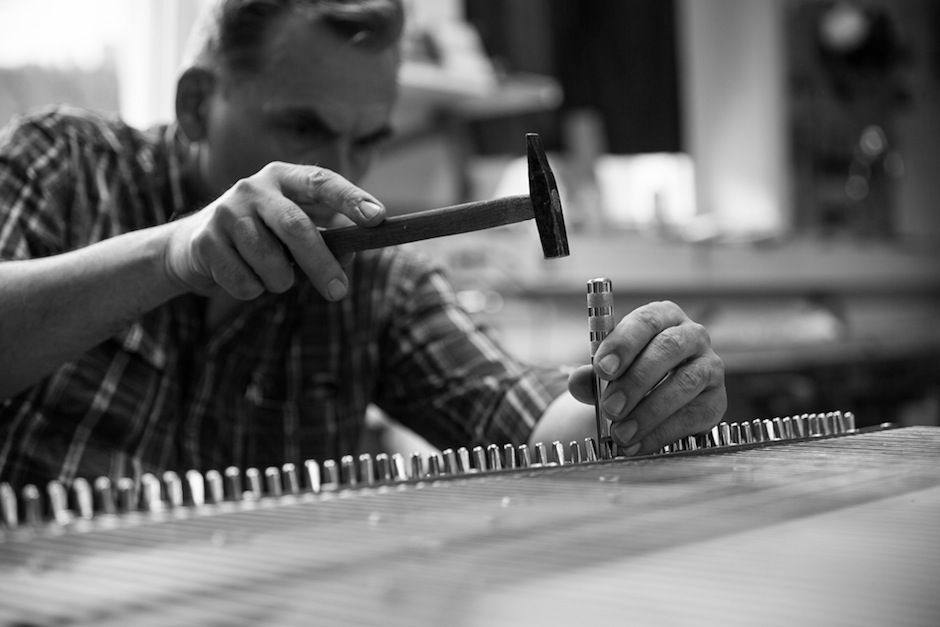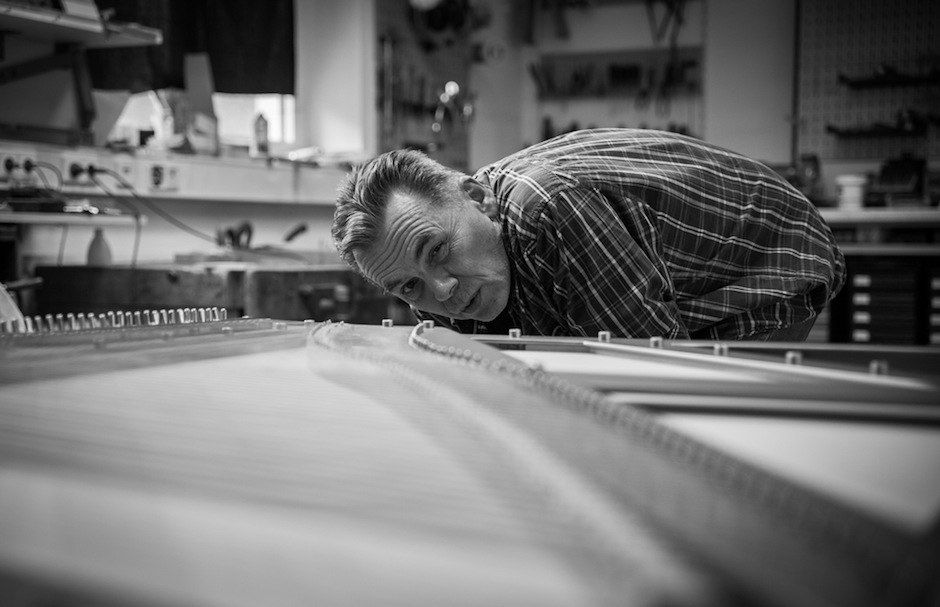
On redesigning the piano: An interview with Nils Frahm
Not content with reinventing piano music, composer Nils Frahm is now reinventing the piano himself—with the help of craftsman David Klavins. Wyndham Wallace went to meet him to find out more ahead of the instrument’s debut at Berlin’s Michelberger Hotel on June 10th.
Nils Frahm has spent the last five years or so reinventing piano music, refusing to be constrained by its familiar restrictions and often modifying the instrument to suit his needs. 2011’s Felt saw the thirty-three-year-old Berliner tamping his piano’s strings with the aforementioned textile, while the following year’s Screws was composed for nine fingers after he broke his thumb falling out of bed. He’s also collaborated with a cast of similarly minded musicians, making downbeat electronica with composer Olafur Arnalds, recording with cellist Anne Müller, engineering Dustin O’Halloran (also known for classical-meets-ambient project A Winged Victory For The Sullen) or producing friend Peter Broderick. Indeed, Frahm is unafraid of employing technology to enhance his art, with his live shows renowned for sheer spectacle as he spins between his different keyboards. The joy of the latter is a fact made clear on last year’s extraordinary live album, Spaces, in which the virtuoso performer combines his traditional instrument with synthesisers and electronic processing to remarkable, dramatic effect. Now Frahm has decided to reinvent the piano itself. In collaboration with David Klavins, a master craftsman based in Balingen, southern Germany, Frahm has developed the Una Corda, an instrument that seeks to overcome the limitations of conventional design. In advance of the Una Corda’s grand unveiling on June 10th at a free event at Berlin’s Michelberger Hotel, Frahm took a short break from his extensive touring schedule to speak to Wyndham Wallace about fulfilling his dream of having an instrument built according to his specifications, and why innovation in the field of pianos is so challenging.
You’re heading home to Berlin soon, but you’ve been on the road quite a while now.
I haven’t seen my place in a very long time! I just played a show in Dublin yesterday, and we’re on the way to Paris. I was also in Denmark working on a theater piece for a couple of weeks, and in Australia. I played the Sydney Opera House, and the response was quite overwhelming.
Not bad for a man who started out playing the piano on his own.
Yeah, I know what you mean. But sometimes I think it’s not only about playing the piano. It’s also about telling stories, and having a narrative in some sort of way, without having lyrics. I love having projects you can talk about, like the whole piano building idea. I also have two old gentlemen building me an organ that I can take on tour. It sounds small, but it’s quite a big thing. It will be a midi-controlled organ made out of two organs which are reassembled.
Like an organ transplant?
Yeah, an organ recycling project where they maybe take down a church, then we rescue the pipes and build them onto a new body. I really like having the opportunity and budget to fulfil my instrument-builder dreams. I always see a possibility to extend the expressions and possibilities of an instrument, and when you start building an instrument, then you can implement so many things which might be new, or odd, or special. So combining composing and playing my music with building the instrument is something quite fun. It made me think of Harry Partch: he built all his instruments himself, and he even had completely new scales. He built, for example, an instrument with forty-two notes within one octave, which is many notes for one octave. People like him inspire me.
Having your own piano and organ built are not cheap projects. Are these things you’re funding yourself?
I’m playing many shows at the moment, and I could probably buy myself a new car with that money, or go shopping, but I don’t need much. I’ve always spent all the money I had on instruments anyway. So rather than buying a nice Steinway, I thought I’d much rather have something built from scratch, because I love buying instruments but buying pianos is my least fun thing. It never feels like a piano is done for me. There’s something wrong about a piano, I think. The piano industry has one big problem: you have to do a cast iron frame, and for that you have to build the form, and that’s very expensive. So once you’ve designed the frame, you want to make at least fifty to five hundred pieces of that very frame. So only Yamaha, Steinway—bigger companies—can afford to design their own piano. The next problem is that Steinway rules the world. There’s nothing bad about Steinway, but they follow a very traditional path. When you see a piano built with wood all around it, it’s very stupid, because all that wood blocks off the sound. Every time I come to a concert venue, I have to disassemble the whole piano to make the sound flow. So I thought, “Why would I want to pay for all that extra wood if I never use it?” I think that a piano was more like furniture one hundred or two hundred years ago, so what it looked like was the biggest concern. My biggest concern is how the piano sounds! Steinway said a hundred years ago, “OK, this is the ideal piano. It can’t be better than this.” That’s their whole problem. Or that’s my problem at least. Yamaha basically builds a Steinway cover, and other big companies, they basically build cheaper Steinways. So there’s only one type of piano out there, and that challenges me because I don’t like uniformity. I like diversity, and I like something unique, to play with something that kind of fits your personality. Then I found David Klavins. He’s an ingenious engineer, and he’s also radical enough to try new things. He doesn’t agree with Steinway’s dogma that the piano can’t be improved. He says it should be like an ongoing evolution.

David Klavins at work
How did you meet?
He got in touch because he wanted me to try The Giant, which he built and is the world’s largest piano. So I drove to Tubingen in south Germany and did a couple of days of recording on that instrument. We talked about my love of very small instruments and he said that he’d always wanted to build a piano that only has one string per note. I’m not sure if you noticed, but a piano normally has three strings per hammer, and that puts almost three times as much tension on the frame. Therefore the frame needs to be heavy, and the whole instrument gets heavy. With one string per note it’s easier to tune, it’s much lighter, it’s much cheaper, and it’s much quieter. I said “That’s my dream instrument!” So he started immediately.
What other qualities does it have that are unique? Using material from old pianos?
That’s something I insisted on, because so many pianos get thrown away after a certain time. Mechanical instruments can’t be repaired, so after a hundred years basically a piano’s dead. I think the wood gets better with time but mechanics don’t. So I said, “Please take the wood from an old instrument so it has some soul already, because if you take brand new wood it might take ten to fifteen years until the wood really eases in.” It’s very inspiring to listen to him talk, because he says, “Let’s not make a piano like they did a hundred years ago. We can do much better with modern technologies today.”
So this is much more than a novelty piano?
It basically shows that pianos can be improved. They don’t need to have eighty-eight keys, they don’t need to be black and shiny, and they don’t need to look like a coffin. I haven’t really played it yet, but from what I know, and from what I’ve seen and heard with sound tests, it’ll be great! I also thought how nice it must be to build an instrument yourself and then play it for the first time and discover what you’ve created. You work for months and months and months, and then the first time sitting down in front of it and playing a couple of notes and going, “That’s it” That must be very thrilling.
So what can we expect from your performance at the Michelberger Hotel? Is it just going to be you and the piano?
I might play one or two tunes. But I want people to touch it. I want people to see it. I want people to ask questions. I want people just to think about the idea of instruments and see how important instruments are to musicians, and how much they change their music. I think instrument builders play one of the biggest roles in the music industry. I’m really aware that people who create instruments for musicians are as important as the musicians. Why should I be the star? The person who builds the instrument should be a star as well.
Finally, are you planning to record a new album any time soon?
I’ve just got to sit down and mix and mix and mix and see what feels good. I have material for five or six albums. It’s not just recording music which makes an album for me. Every album so far has a nice story you can talk about. So I wonder what will be the story of the next one. The music will follow the story. ~

Published June 05, 2014. Words by wyndhawallace.
